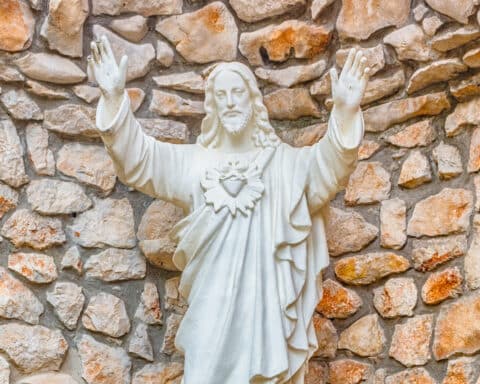Whenever we pray the “Our Father,” we address God, asking: “Thy kingdom come, Thy will be done.” It may not seem at first glance that this is what the readings for this Sunday are about. But that is only the case if we isolate this Sunday’s readings from all the preceding weeks in which Matthew’s Gospel has offered us an understanding of the kingdom of God. Much of this education was carried out as Christ preached in parables, offering us an education about his very self as the living Gospel, as the kingdom itself.
For us, as for Christ, these two petitions within the “Our Father” are related. They are also related to our readings for this Sunday, as I have just suggested. But, first things first!
The Catechism of the Catholic Church shows us how these two petitions, regarding God’s kingdom and God’s will, are related. First, the Catechism confirms that Christ, himself, is the kingdom: “The Kingdom of God … is brought near in the Word incarnate, it is proclaimed throughout the whole Gospel, and it has come in Christ’s death and Resurrection” (Catechism, No. 2816). Put differently, the kingdom came through the cross, through Christ losing his life, in order to gain it (cf. Mt 16:21-27).
Even for Christ, this was not easy. He rebukes Peter, who shudders at the very idea that Christ will have to suffer. Christ tells Peter, “You are an obstacle to me.” And we know that Christ will be in agony in the Garden of Gethsemane as he gives his human will over to the Father, himself praying, “Thy will be done, not mine.” Only by reconciling his human will to that of God’s, will Christ reveal the substance and source of life: God’s love for us, thereby inaugurating the kingdom of God within the world.
| September 3 – 22nd Sunday in Ordinary Time |
|---|
|
Jer 20:7-9 Ps 63:2, 3-4, 5-6, 8-9 Rom 12:1-2 Mt 16:21-27 |
In this Sunday’s Gospel reading, Christ calls us to citizenship in the kingdom of God. More precisely, Christ calls us to take up our cross and follow him. He calls us to God’s will rather than our own. It may feel like a “death” at first, but it will lead to our resurrection … to life!
The Catechism tells us: “His commandment is ‘that you love one another; even as I have loved you, that you also love one another.’ This commandment summarizes all the others and expresses his entire will” (Catechism, No. 2822).
At times, though, this commandment can feel like a cross! And, if it was with difficulty that even Christ gave up his human will to such a cross, what are we to do? How are we to “follow him”? To do “his entire will”?
“The Kingdom of God,” the Catechism assures us, “has been coming since the Last Supper and, in the Eucharist, it is in our midst” (Catechism, No. 2816).
Aha! We have, daily if we desire it, the help of the Eucharist. We have, therefore, the help of Christ himself, the person who vivifies the kingdom, who is love active in our world and in ourselves.
This actually brings us beyond the connection I promised between “Thy kingdom come” and “Thy will be done,” to the next petition of the “Our Father:” “Give us this day our daily bread.” Of this petition, the Catechism comments: “The Father in heaven urges us, as children of heaven, to ask for the bread of heaven. [Christ] himself is the bread who, sown in the Virgin, raised up in the flesh, kneaded in the Passion, baked in the oven of the tomb, reserved in churches, brought to altars, furnishes the faithful each day with food from heaven” (Catechism, No. 2837).





